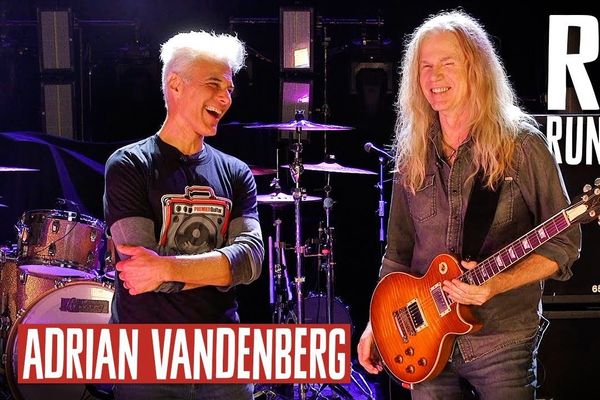The wonders of playing in a trio
Consider the number three. A triangle is
known as a stable figure. A table holds
steady with three legs. Youngsters feel safe
on a tricycle. Sometimes there’s no escaping a triangle, so strong is its energy. The
Bermuda Triangle. A love triangle.
I find that playing a solo gig can be easier
than playing a duo gig, surprisingly. But add
a third voice and all is well. There are so
many wonderful combinations of instruments
that can be arranged into trio form, each one
with its own uniquely creative possibilities.
This month, we’re exploring the very traditional setting of guitar-bass-drums.
Trio playing can be one of the most rewarding
experiences to share with fellow musicians.
The musical conversations that take place
within a trio can be surprising, stimulating,
inspiring, neat, messy, light-hearted, thunderous, polite, or downright raucous. If we
remember that it is indeed a conversation
that is taking place in a performance, we
stand ready to make some trio magic happen.
In a standard trio, typically, the guitarist
states the melody, takes a solo, nods to the
bass player for a solo, and then either takes
the head out or gives the drummer a chorus
or two before wrapping it up. Variations on
that pattern commonly include trading fours
with the drummer after the bass solo, or
maybe giving the bass player the first solo.
Let’s zoom in a little on a fictional trio: The
Deluge Three. It looks like they have “All the
Notes We Know” up on the stand ready to
play. The guitarist is playing a well-voiced
chord-melody to state the theme, and skill-
fully filling the held notes and rests in the
melody with some brilliantly executed scales
and re-harmonized chords. The bass player is
hitting the roots in all the right places, as well
as jumping on the chord tones in between,
filling the time between melodic phrases with
some dazzling and intricate arpeggios, and
leaving no doubt as to the chord progression
in play. The drummer is keeping the tempo
right where it was counted off, even though
he is busy filling in all of that space that he
knows a trio is in danger of leaving.
Zoom out. What an exhausting conversation
that was!
In a more experienced and thoughtful trio, each
part becomes beautifully exposed, rather than
smothered. Single-note lines by the guitar play-
er are played over the simplest of bass parts,
steadfastly keeping the time moving forward
while the drummer concurs. They are listening,
occasionally interjecting an agreeable statement
with a kick or a slide. The guitar player confidently takes a breath, conscientiously considering his next phrase, knowing that the bassist
and drummer are patient and on his side, nodding along and enjoying the story.
Just like a great film that requires you to
think and feel and deduce, rather than tell
you everything about each character and plot
line, a great trio performance leaves listeners
with implications of harmony by giving them
just enough to go on without spoiling the fun
of solving the mysteries for themselves. Just
as the musicians need to trust each other in
this form, they need to trust the listeners.
Listening to each other and responding
appropriately in turn is the best thing we can
practice, both in conversation and in playing
jazz together. The trio format is a wonderful
context in which to try out this exercise. The
trust that develops can lead to more creativity in a trio. When Emily Remler was recording
with Eddie Gomez on bass and Bob Moses
on drums, she related to me these words of
wisdom from Bob Moses: “Don’t worry, we’ll
comp for you.” Indeed, listening to mindful
drummers in a trio reveals a sense of melody
and harmony in the choices they make.
I was in Boston-based, Japanese-born guitarist Tomo Fujita’s office recently, and we
listened to a few tracks from his new CD,
Pure (available from nimbit.com). Tomo’s
blues roots meld nicely with a jazz sensibility. Throughout, the guitar lines are clear and
tasteful, the bass (Will Lee) is simple, solid,
and present, and the drums (Steve Gadd on
the tracks that I heard; Bernard Purdie and
Steve Jordan on other tracks) provide just
the right fresh comments and grooves. The
simple-yet-eloquent parts make a trio sound
that works as a whole.
Other approaches you might want to experiment with include a more free-spirited musical experience in which the usual roles of
time keeping, melody playing, and harmony
defining get redistributed. This can be as
exciting as a conversation with the best of
friends that features profound metaphors,
thoughtful wit, and exhilarating silliness.
Things get taken up a notch. You’ll need to
stay on your toes to keep your place. But
in a generous gathering of musical minds,
you’ll be allowed to lay out until you find your
moment to speak up again. Listening makes it
all possible.
Here is a short list of recorded trios to listen to
and learn from. It’s hard to talk about jazz trios
without thinking of our piano-playing friends,
so I am including some piano trios here, too.
Pat Metheny: Bright Size Life; Jaco Pastorius,
bass; Bob Moses, drums (ECM)
Jim Hall: Jim Hall Live; Don Thompson, bass;
Terry Clarke, drums (Concord)
Emily Remler: Catwalk; Eddie Gomez, bass;
Bob Moses, drums (includes some overdubbed
parts but not on solo sections) (Concord)
Bill Frisell: with Dave Holland and Elvin Jones;
Dave Holland, bass; Elvin Jones, drums
(Nonesuch)
Mike Stern: Standards (and Other Songs); Jay
Anderson, bass; Al Foster, drums (other musi-
cians appear on selected tracks) (Atlantic)
Bill Evans Trio: Sunday at the Village
Vanguard; Bill Evans, piano; Scott LaFaro,
bass; Paul Motian, drums (Riverside)
McCoy Tyner Trio: Inception; McCoy Tyner,
piano; Art Davis, bass; Elvin Jones, drums
(MCA Impulse)
Jane Miller is a guitarist, composer, and arranger with roots in both jazz and folk. In addition to lead- ing her own jazz instrumental quartet, she is in a working chamber jazz trio with saxophonist Cercie Miller and bassist David Clark. The Jane Miller Group has released three CDs on Jane’s label, Pink Bubble Records. Jane joined the Guitar Department faculty at Berklee College of Music in 1994.
janemillergroup.com

